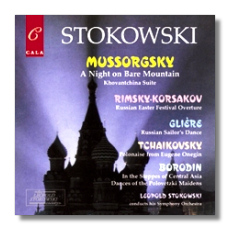
The Internet's Premier Classical Music Source
Related Links
-
Borodin Reviews
Glière Reviews
Mussorgsky Reviews
Rimsky-Korsakoff Reviews
Tchaikovsky Reviews - Latest Reviews
- More Reviews
-
By Composer
-
Collections
DVD & Blu-ray
Books
Concert Reviews
Articles/Interviews
Software
Audio
Search Amazon
Recommended Links
Site News
 CD Review
CD Review
A Russian Spectacular

- Modest Mussorgsky:
- A Night on Bare Mountain (orch. Stokowski)
- Khovantchina
- Act 1: Prelude (Dawn over Moscow) [orch. Rimsky-Korsakov]
- Act 4: Dance of the Persian Maidens [orch. Rimsky-Korsakov]
- Act 4: Entr'acte (Prince Galitsin's Journey) [orch. Stokowski]
- Nikolai Rimsky-Korsakoff: Russian Easter Overture *
- Reinhold Glière: The Red Poppy (Russian Sailor's Dance)
- Piotr Ilyitch Tchaikovsky: Eugene Onegin (Polonaise)
- Alexander Borodin:
- In the Steppes of Central Asia
- Prince Igor (Dances of the Polovetzki Maidens)
* Nicola Moscona, bass
Stokowski Symphony Orchestra/Leopold Stokowski
Cala CACD0546
An old friend of mine, Al Franz, once managed a record shop and kept an excellent selection of classical music. He was always into the audiophile scene. After the advent of the CD he still kept a state-of-the-art turntable and a large collection of LPs. I'd go to visit and we'd listen to his LPs through dual headphones of his that looked like mini-speakers over our ears. He would beam as we listened and say, "There's more music in those grooves than most people can get out." This release is a case in point to prove he was correct. In fact, the LPs of these recordings never sounded this good. You might be fooled into thinking that they are early stereo instead of 1953 (and the Borodin Dances was recorded in 1950). The aural sense of depth, air around the music, a soundstage that is lateral and vertical that can be heard in this incarnation is simply amazing. It has certainly changed my perceptions of these recordings from listening to the LPs. Everything now seems almost like different music.
The "Night on the Bare Mountain" may be my favorite of the four commercial Stokowski recordings. Stokowski's ad hoc orchestra included some of the finest musicians in New York City at that time; for that matter, some of the finest in the world. This particular recording sounds as though the musicians were not just playing the music; they were enjoying it. Dawn over Moscow evokes an image of watching the sun emerge in the East. It is a magical experience.
Using a bass in lieu of the trombone solo in the Rimsky piece is simply a work of genius. Ed Johnson's excellent notes opine, "Stokowski opted for the authentic touch and engaged Nicola Moscona to intone the ancient Slavic text instead, singing as if from afar in a vast cathedral." I'm not sure how "authentic" it is but I love it and have come to prefer it over the more traditional use of the trombone.
I could go on and rave about the other items in this collection. At a certain point, however, it begins to sound like a lot of hyperbole. So, I'll cut to the quick.
I am really enjoying this release. The music is just so involving. In other reviews I have spent some time elaborating on the ad hoc nature of HIS Symphony Orchestra. One of regulars was Bob Bloom on oboe. I had the pleasure of meeting with him and interviewing him once.
Ed Johnson's notes also discuss the orchestra. The bottom line is that with some of the finest musicians of the time and using the ability to change the sound with tape, The Old Magician made a group of about 60, sound like twice that size. Given the quality of the players, Stokowski was also able to mold the sound like a painter on a canvas. What CALA has provided us is a wonderful evening (or more) of listening to A Russian Spectacular.
Copyright © 2007, Robert Stumpf II





















